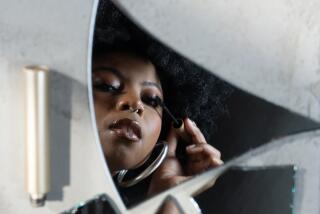A Change of Face : Cosmetic Surgery Poses Special Considerations for Black Women
- Share via
AS COSMETIC SURGERY continues to flourish in Southern California, doctors are beginning to realize that minorities, who traditionally have avoided such procedures, are now their largest untapped source of clients. The number of black patients, among others, is increasing.
Recently, black women have been having their nostrils narrowed, encouraged perhaps by the admission of Janet, LaToya and Michael Jackson that their noses have been “touched up.” And black women who once would not even consider cosmetic surgery are now deliberating it in public.
“Look,” one 40-year-old with an early-30s face says firmly, “as soon as something starts to droop or sag, if I can afford it, I’m going to do it.”
Is the lure of cosmetic surgery for minorities the same as for whites--that is, to look one’s best? Or are there psychological factors to weigh? Brenda Wade, a black clinical psychologist in San Francisco, believes strongly that the urge for nose-narrowing “is not plain old vanity. If you’re an African-American and you seek to have your nose altered, you want to look less African. It’s a move toward mainstream America’s vision of beauty.” That blond, blue-eyed image, Wade points out, excludes several white ethnic groups as well.
But Pearlman Hicks, a member of the American Society of Plastic and Reconstructive Surgeons, says: “Black patients are coming to me not because they want to look white but because they want features that are more in proportion to each other.” Hicks, who is black, has offices in Long Beach and Inglewood and says he is beginning to see a substantial number of black patients.
“To make a really broad nose a bit more narrow in a small face won’t make it look less black, only more balanced,” Hicks insists. But he says that patients who want features with Caucasian proportions should think twice. “They could end up like Michael Jackson, whose nose looks very unnatural.”
Some African-Americans would no sooner conceal evidence of their ethnic heritage than they would change the color of their eyes to blue or violet (a contact-lens controversy). “I plan to keep my African nose,” psychologist Wade says with a laugh, but she notes that the media’s historic portrayal of the prevailing aesthetic ideal is a powerful influence on those who don’t fall within the ideal’s parameters.
“It’s absolutely true that every African-American has grown up feeling that to be accepted, one had to aspire to the white norm of beauty,” she says.
Psychological questions aside, there are physiological considerations for black women contemplating cosmetic surgery. The keloid trait, which causes wounds to heal with raised scars, is common among African-Americans. Although most such scars are external, potentially harmful internal scars are possible. No test can determine who has the keloid trait, but a doctor can find out what he needs to know by looking at old scars.
Another problem, Hicks says, is hypopigmentation or hyperpigmentation--skin discoloration that is, respectively, much lighter or darker than the rest of the body. If surgery leaves any scarring, a vastly different-colored scar can result.
“We can often correct that,” says Carla Herriford, co-director of the Institute for Aesthetic and Cosmetic Dermatology, a Los Angeles group that treats pigment disorders. Common methods are melanin stimulation for too-pale spots, and hydroquinone bleaching for dark patches.
There’s a kernel of truth to the old boast that claims black skin ages more gracefully than its Caucasian counterpart. “Because black skin has more melanin, we tend to look younger longer,” Herriford says.
Hicks agrees: “My black patients who come for face lifts are 10 to 15 years older than my white ones; they don’t seem to age as quickly.” Thicker, more elastic skin is one reason. Increased melanin, which guards against damage from ultraviolet rays, is another. But even darker skin can be harmed by the sun, Herriford warns. “Blacks have been very cavalier about the sun, but we advocate sunscreen for everybody. Black people do burn.”
Whether to lift or sculpt is, of course, up to the individual. But as the cult of the body beautiful continues to swell, and as more surgeons offer patients extended-payment plans and computer-assisted imaging (which approximates how the new face will look), minorities almost certainly will become an increasingly significant segment of the cosmetic surgery market.






